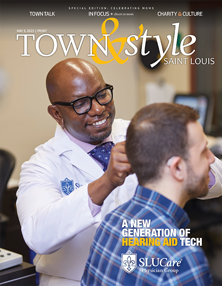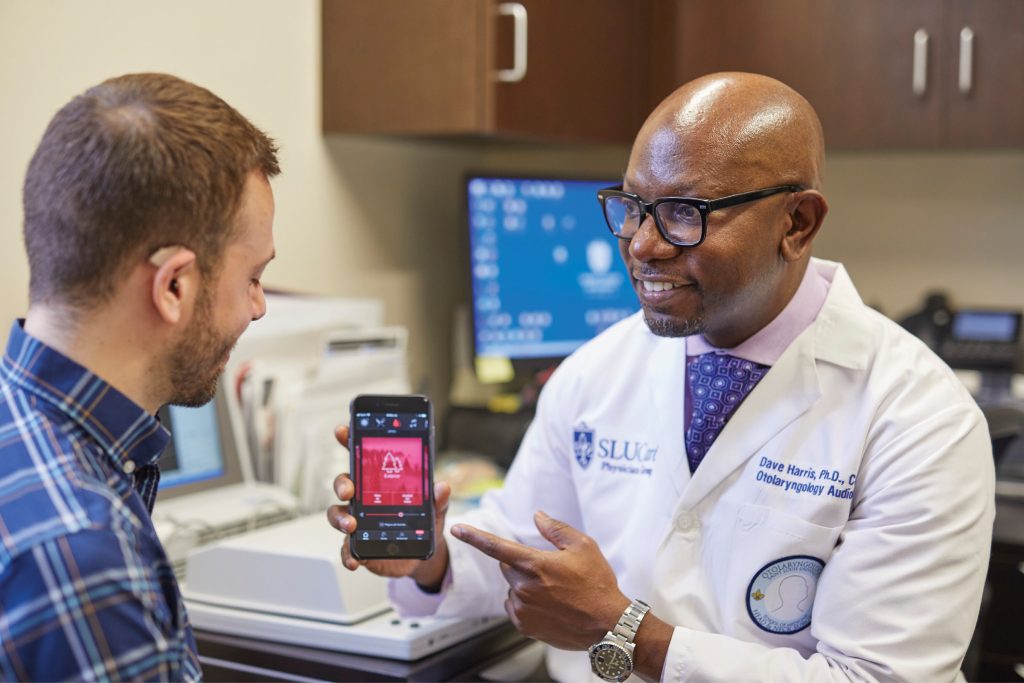
“Hearing aids are definitely moving in the direction of health data tracking,” says Harris, who sees patients at the Center for Specialized Medicine at SSM Health Saint Louis University Hospital. “They are designed to act like a FitBit or Apple Watch and can perform a variety of functions. Some makers are producing aids that can monitor temperature, heart rate and blood pressure, and they soon may be able to do things like analyze ear canal secretions and measure blood sugar.” Harris says the devices can share tracking data with physicians as well, to help them stay abreast of any changes in health indicators.
Recent advancements allow people to pair the aids with their laptops, smartphones or other devices. “The phone connects wirelessly to one hearing aid, usually the right one, and it sends information to the left side so the person can hear in stereo as humans normally would,” Harris explains. “It’s huge for people with hearing loss to be able to use both ears. The sound quality is better and more natural, and the brain processes it more effectively.”
Harris says the technology can be life-changing for children who have difficulty hearing in the classroom or adults who work in a variety of settings. For example, a judge who has trouble hearing jurors’ questions could benefit from a microphone that streams sound data to the judge’s hearing aids. “There are a lot of exciting applications for this,” Harris says.
While the availability of over-the-counter hearing devices has been expanding, it’s still important for patients to discuss appropriate solutions with a professional, Harris notes. He says an evaluation is needed for a number of reasons, including the fact that hearing loss often occurs gradually and people may not realize how far it has advanced. “By the time you actually perceive hearing loss, you are probably at a moderate level of severity and likely would not qualify for over-the-counter devices anyway,” he says. “Also, you might spend a lot of money on over-the-counter aids only to discover they are not right for you.”
He likens the situation to signing up for a gym membership without a personal trainer, so there’s no guidance on health goals or proper use of the equipment. “It’s the same as getting hearing aids without an evaluation,” he says. “Our staff can counsel patients on what to expect and how to use the technology for the best possible results.”
Harris says the practice also can assist people dealing with balance problems, vestibular migraines and related issues. Whatever their needs, patients can be certain they will receive complete, personal attention from SLUCare professionals. “We can discuss expectations, learn the patient’s preferences, then work toward the best, most natural solution,” Harris notes. “We want people to hear and feel better than they did before, and the first step is getting the right care.”
The SLUCare Audiology and Balance practice offers complete diagnostics and care for patients with hearing loss and related issues. Pictured on the cover: SLUCare clinical audiologist Dave Harris. For more information, visit slucare.com/hearing.
Cover design by Julie Streiler
Cover photo courtesy of SLUCare Physician Group
Pictured at top: SLUCare clinical audiologist Dave Harris works with a patient.
Photo courtesy of SLUCare Physician Group
